
U2 are an Irish rock band formed in Dublin in 1976. The group consists of Bono, the Edge, Adam Clayton, and Larry Mullen Jr.. Initially rooted in post-punk, U2's musical style has evolved throughout their career, yet has maintained an anthemic quality built on Bono's expressive vocals and the Edge's chiming, effects-based guitar sounds. Bono's lyrics, often embellished with spiritual imagery, focus on personal and sociopolitical themes. Popular for their live performances, the group have staged several elaborate tours over their career.

Achtung Baby is the seventh studio album by Irish rock band U2. It was produced by Daniel Lanois and Brian Eno, and was released on 18 November 1991 on Island Records. After criticism of their 1988 release Rattle and Hum, U2 shifted their direction to incorporate influences from alternative rock, industrial music, and electronic dance music into their sound. Thematically, Achtung Baby is darker, more introspective, and at times more flippant than their previous work. The album and the subsequent multimedia-intensive Zoo TV Tour were central to the group's 1990s reinvention, by which they abandoned their earnest public image for a more lighthearted and self-deprecating one.

Pop is the ninth studio album by Irish rock band U2. It was produced by Flood, Howie B, and Steve Osborne, and was released on 3 March 1997 on Island Records. The album was a continuation of the band's 1990s musical reinvention, as they incorporated alternative rock, techno, dance, and electronica influences into their sound. Pop employed a variety of production techniques that were relatively new to U2, including sampling, loops, programmed drum machines, and sequencing.
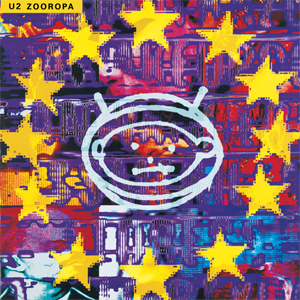
Zooropa is the eighth studio album by Irish rock band U2. Produced by Flood, Brian Eno, and the Edge, it was released on 5 July 1993 on Island Records. Inspired by the band's experiences on the Zoo TV Tour, Zooropa expanded on many of the tour's themes of technology and media oversaturation. The record was a continuation of the group's experimentation with alternative rock, electronic dance music, and electronic sound effects that began with their previous album, Achtung Baby, in 1991.
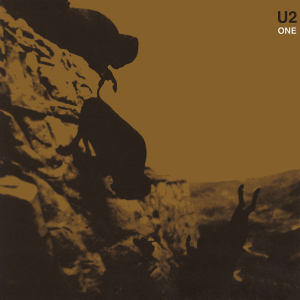
"One" is a song by Irish rock band U2. It is the third track from their seventh album, Achtung Baby (1991), and it was released as the record's third single on 24 February 1992. During the album's recording sessions at Hansa Studios in Berlin, conflict arose between the band members over the direction of U2's sound and the quality of their material. Tensions almost prompted the band to break up until they achieved a breakthrough with the improvisation of "One"; the song was written after the band members were inspired by a chord progression that guitarist the Edge was playing in the studio. The lyrics, written by lead singer Bono, were inspired by the band members' fractured relationships and the German reunification. Although the lyrics ostensibly describe "disunity", they have been interpreted in other ways.
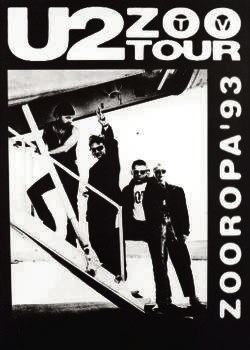
The Zoo TV Tour was a worldwide concert tour by rock band U2. Staged in support of their 1991 album Achtung Baby, the tour visited arenas and stadiums from 1992 to 1993. It was intended to mirror the group's new musical direction on Achtung Baby. In contrast to U2's austere stage setups from previous tours, the Zoo TV Tour was an elaborately staged multimedia spectacle, satirising television and media oversaturation by attempting to instill "sensory overload" in its audience. To escape their reputation for being earnest and over-serious, U2 embraced a more lighthearted and self-deprecating image on tour. Zoo TV and Achtung Baby were central to the group's 1990s reinvention.

"Who's Gonna Ride Your Wild Horses" is a song by Irish rock band U2. It is the fifth track on their 1991 album Achtung Baby, and was released as its fifth and final single in November 1992.
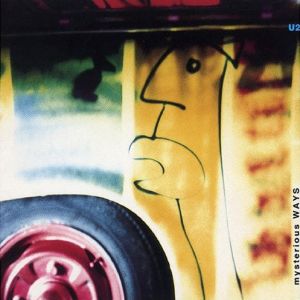
"Mysterious Ways" is a song by Irish rock band U2. It is the eighth track from their 1991 album, Achtung Baby, and was released as the album's second single on 2 December 1991, two weeks after the album. The song began as an improvisation called "Sick Puppy", with the band liking only the bass part that bassist Adam Clayton composed. The band struggled to build a song from it, with vocalist Bono and producer Daniel Lanois arguing intensely during one songwriting session. The song's breakthrough came after guitarist the Edge began experimenting with the Korg A3 effects unit. "Mysterious Ways" features a danceable beat, funky guitar hook, and conga-laden percussion, as well as mystical lyrics by Bono about romance and women.

"The Fly" is a song by Irish rock band U2. It is the seventh track from their 1991 album, Achtung Baby, and it was released as the album's first single on 21 October 1991 by Island Records. "The Fly" introduced a more abrasive-sounding U2, as the song featured danceable hip-hop beats, industrial textures, distorted vocals, and an elaborate guitar solo. Lead vocalist Bono described the song as "the sound of four men chopping down The Joshua Tree", due to its departure from the sound that had traditionally characterised the band in the 1980s.
"Zoo Station" is a song by Irish rock band U2. It is the opening track from their 1991 album Achtung Baby, a record on which the group reinvented themselves musically by incorporating influences from alternative rock, industrial, and electronic dance music. As the album's opening track, "Zoo Station" introduces the band's new sound, delivering industrial-influenced percussion and several layers of distorted guitars and vocals. Similarly, the lyrics suggest the group's new intents and anticipations. The introduction, featuring an "explosion" of percussion and a descending glissando for a guitar hook, was meant to make the listener think the album was mistakenly not U2's latest record or that their music player was broken.
"Until the End of the World" is a song by rock band U2 and the fourth track from their 1991 album Achtung Baby. The song began as a guitar riff composed by lead vocalist Bono from a demo, which the band revisited with success after talking with German filmmaker Wim Wenders about providing music for his film Until the End of the World. The song's lyrics describe a fictional conversation between Jesus Christ and Judas Iscariot. The first verse discusses the Last Supper; the second is about Judas identifying Jesus with a kiss on the cheek in the Garden of Gethsemane; and the final is about Judas' suicide after being overwhelmed with guilt and sadness.
"Ultraviolet (Light My Way)" is a song by Irish rock band U2. It is the tenth track from their seventh studio album Achtung Baby. Ostensibly about love and dependency, the song also lends itself to religious interpretations, with listeners finding allusions to the Book of Job and writers finding spiritual meaning in its invocation of the light spectrum.
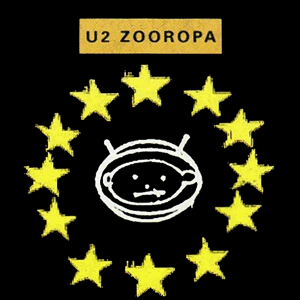
"Zooropa" is a song by Irish rock band U2, and is the opening track from their 1993 album of the same name. The song was the result of combining two pieces of music, the first of which was conceived in the studio, and the second of which was a soundcheck recording from one of the group's concert tours that was discovered by guitarist the Edge. The lyrics were written by lead vocalist Bono and describe two characters in a brightly lit city in a futuristic version of European society. Some lyrics in the song were taken directly from advertising slogans, and they also featured the phrase "dream out loud", which has appeared in other U2 media. The song touched on several themes, including moral confusion and the future of European society.
This is a timeline of the history of rock band U2:
"Mothers of the Disappeared" is a song by Irish rock band U2. It is the eleventh and final track on their 1987 album The Joshua Tree. The song was inspired by lead singer Bono's experiences in Nicaragua and El Salvador in July 1986, following U2's participation in the Conspiracy of Hope tour of benefit concerts for Amnesty International. He learned of the Madres de Plaza de Mayo, a group of women whose children had "forcibly disappeared" at the hands of the Argentine and Chilean dictatorships. While in Central America, he met members of COMADRES, a similar organization whose children had been abducted by the government in El Salvador. Bono sympathized with the Madres and COMADRES and wanted to pay tribute to their cause.
"Exit" is a song by rock band U2. It is the tenth track on their 1987 album The Joshua Tree. "Exit" was developed from a lengthy jam that was recorded in a single take and edited down to a shorter arrangement. The lyrics, which portray the mind of a serial killer, were inspired by lead singer Bono's reading of Norman Mailer's 1980 novel The Executioner's Song, and other related works.
"Acrobat" is a song by rock band U2, and is the eleventh track on their 1991 album Achtung Baby. The song developed from a riff created by guitarist the Edge, and is played in a 12
8 time signature. Lyrically, the song expresses themes of hypocrisy, alienation, and moral confusion. Although "Acrobat" was rehearsed prior to the third leg of the Zoo TV Tour, it had not been performed live until its debut on the Experience + Innocence Tour on 2 May 2018.
"Love Is Blindness" is a song by rock band U2, and the twelfth and final track on their 1991 album Achtung Baby. The song was written on piano by lead singer Bono during the recording sessions for U2's 1988 album Rattle and Hum. Originally intending to give the song to singer Nina Simone, the band decided to keep it for Achtung Baby after playing it together. Thematically, the song describes a failing romance, mixing personal themes with imagery of metaphorical acts of terrorism. During the recording sessions for Achtung Baby, guitarist the Edge separated from his wife, Aislinn O'Sullivan. The separation had a major effect on the development of the song; Bono said that the ending guitar solo was a cathartic experience for the Edge, as he snapped several guitar strings during the recording.

"Stay " is a song by Irish rock band U2. It is the fifth track on their eighth album, Zooropa (1993), and it was released as the album's third single on 22 November 1993 by Island Records. The song reached number one in Ireland and reached the top 10 in Australia, Iceland, the United Kingdom, and several other countries. The accompanying music video, directed by Wim Wenders, was shot in Berlin, Germany. The earliest incarnation of the song developed during sessions for the group's 1991 album Achtung Baby. It was written for and inspired by Frank Sinatra and bore his surname as the original working title. An alternative recording was used in the 1993 film Faraway, So Close!, also by Wim Wenders.











